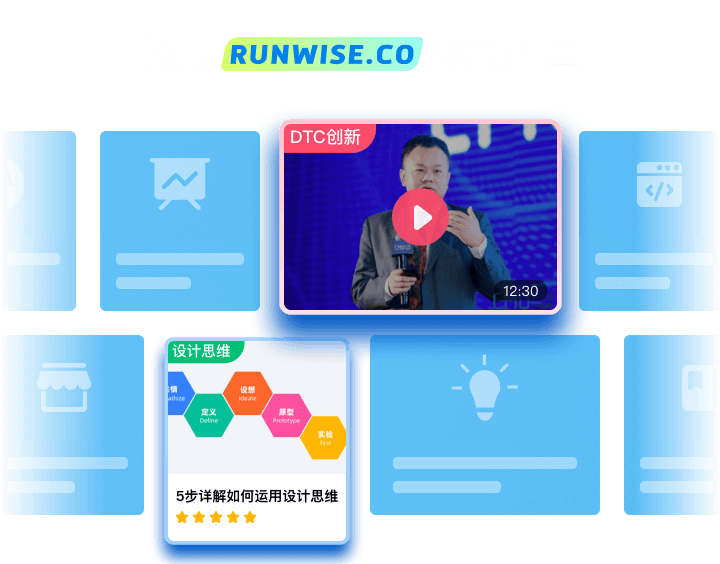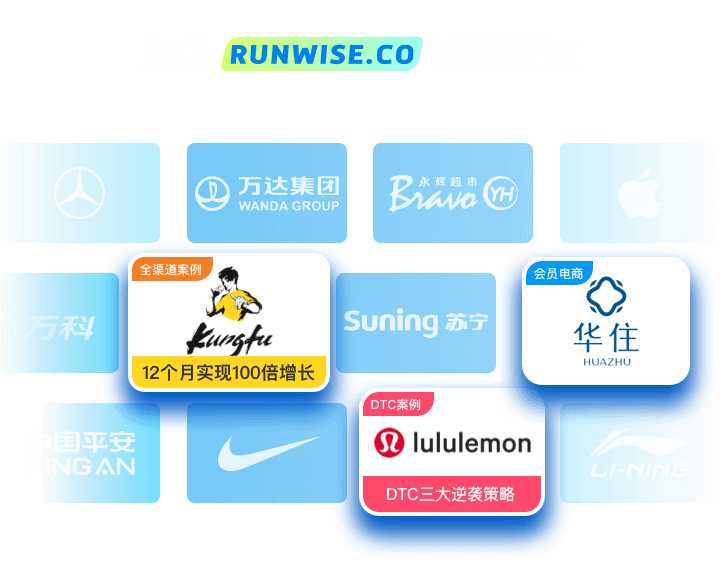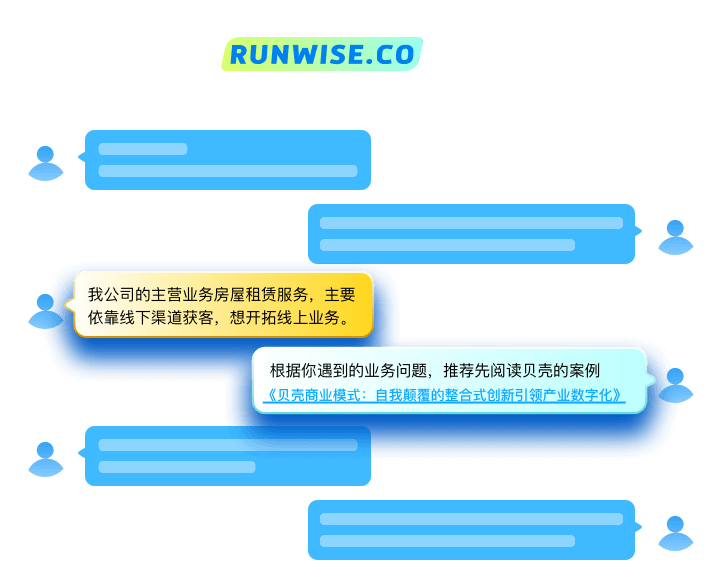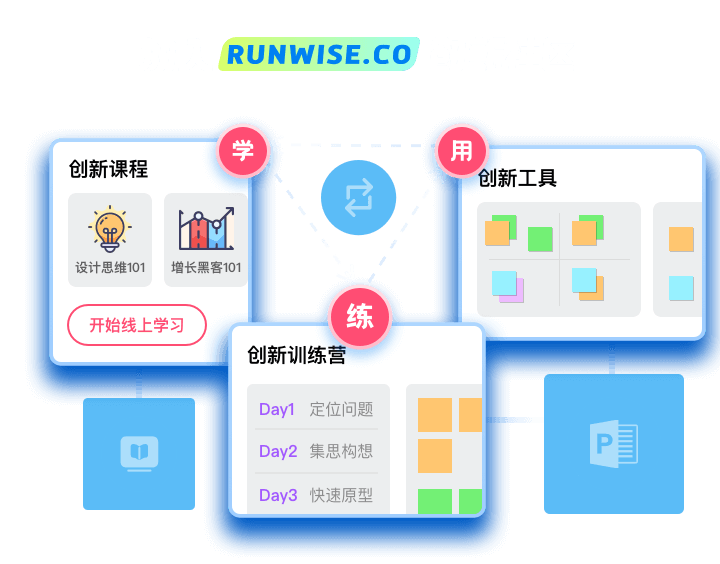您的团队是否也陷入了“越大越低效”的困境?本文揭示顶级CEO用小团队实现2亿营收的秘诀,亲授10个颠覆认知的“反内卷”增长心法,从根源消除业务瓶颈,打造一支精锐战队。立即学习如何用“人效”驱动增长。
🚀 Runwise核心洞察:10个提升团队人效的反内卷心法
团队规模越大效率越低?顶级CEO用以下10条实战经验打破增长瓶颈:
- 精准定位阶段: 拒绝盲目扩张,只打与企业当前发展周期(生存/扩张/成熟)匹配的关键战役。
- 极度聚焦优先级: 像保护现金一样保护时间,无情砍掉非核心任务,拒绝“什么都想要”。
- 保持紧密沟通: 缩短反馈链路,拒绝低效的形式主义会议,确保信息流动零阻碍。
- 给予清晰所有权: 赋予员工明确的权责,消除推诿,激发“这是我的业务”的主人翁感。
- 文档化重复工作: 将高频流程标准化(SOP),降低对特定人员的依赖,提升可复制性。
- 坚持每周复盘: 建立高频反馈机制,快速识别问题并纠偏,而非等到季度末算总账。
- 全面自动化: 积极利用AI和SaaS工具替代重复劳动,释放团队的核心创造力。
- 学会充分授权: 管理者通过放权打破自身瓶颈,避免成为业务流程中的“拥堵点”。
- 为适应性招聘: 招聘具备学习能力和适应变化的人才,而非仅具备单一技能的工具人。
- 公开认可胜利: 庆祝每一个小的里程碑,通过正向反馈打造高士气、高绩效的团队文化。
👇 下文将为您详细拆解每一条心法的具体落地指南与实战案例。
办公室的“幽灵”:为什么加人,反而让公司变慢了?
“再给我加5个人,这个季度的KPI肯定能完成!”
作为一名管理者,这句话您是不是听得耳朵都快起茧了?或者,这正是您此刻正准备对老板说的话。在我们的惯性思维里,业务增长似乎天然就与团队扩张划上了等号。市场大了,需要更多销售;产品线多了,需要更多研发;客户多了,需要更多客服……逻辑听起来天衣无缝。
但让我们暂停一秒钟,回忆一个您一定经历过的场景:
公司初创时,可能只有三五个人挤在一间小办公室里。那时候,沟通靠吼,协作靠走动,一个眼神就能解决问题。每个人都像八爪鱼一样,身兼数职,但效率惊人,项目推进得飞斯。公司充满了活力和希望。
几年后,公司搬进了宽敞明亮的写字楼,团队扩张到了几十甚至上百人。我们有了规范的流程、层级分明的组织架构和昂贵的协同软件。但奇怪的事情发生了:跨部门沟通开始变得像一场漫长的“接力赛”,充满了等待和交接棒时的失误;一个简单的决策,需要经过层层审批,等邮件回复等到黄花菜都凉了;团队成员开始抱怨“不知道其他人在干嘛”,开会的频率和时长与日俱增,但解决的实际问题却越来越少。
我们以为通过增加人手,可以更快地到达目的地,却发现自己只是造了一艘更大、更笨重、更容易搁浅的船。我们不断地给这艘船增加“划桨手”,却忽略了船体内部那些看不见的“藤壶”和“暗礁”——那些真正拖慢航速的瓶颈。
这,就是我们办公室里那个心照不宣的“幽灵”。而您,作为管理者,往往是那个最晚离开办公室、感觉最身心俱疲的人,眼看着团队越来越大,前行的速度却越来越慢。
我曾与一位连续创业者,亚历克斯,有过一次深度交流。他亲手将三家截然不同的公司,用令人难以置信的小团队,做到了累计超过2亿美元的营收。当我向他请教成功的秘诀,期待听到什么颠覆性的商业模式或黑科技时,他的回答却让我陷入了沉思。
他说:“你需要的不是更多的员工,而是更少的瓶颈。我的所有管理哲学,都围绕着一件事:如何用最聪明的方式,让一支精悍的团队,发挥出超越其规模的巨大能量。”
他分享给我的,正是那10条看似简单,却蕴含着深刻管理智慧的“心法”。这些心法,不是写在教科书里的理论,而是他在一次次商业实战中,用真金白银换来的宝贵经验。它们像一把手术刀,精准地剖开了企业增长的本质,直指那些被我们日常忽略,却致命的组织效率问题。
这篇文章,就是我将亚历克斯的智慧,结合我多年来的管理观察和实践,为您进行的深度复盘和拆解。无论您是正在为团队扩张而烦恼的初创公司CEO,还是身处大企业中,感觉被流程和冗员所困的中高层管理者,相信我,接下来的内容,将会彻底改变您对“增长”和“团队”的看法。
准备好了吗?让我们一起,揪出办公室里的那个“幽灵”,学习如何用“小而美”的团队,撬动“大而强”的增长。
增长心法一:精准定位,只打阶段性的关键战役 (Pinpoint Your Stage, Fight Only The Key Battles)
核心箴言: 你的决策,必须基于企业当下的现实,而非你期望它所处的未来。
这是所有策略的基石,也是最容易被管理者,尤其是创始人忽视的一点。我们常常被宏伟的蓝图和遥远的目标所激励,以至于在做决策时,不自觉地用“五年后的公司”的标准,来要求“今天的团队”。这就像让一个刚学会走路的婴儿,去参加百米冲刺比赛,结果可想而知。
管理的本质是“适配”。 不同的发展阶段,企业的核心矛盾、资源配置的优先级、团队的管理方式,都截然不同。
生存期 (0-1): 这个阶段的核心任务是验证产品市场匹配度 (PMF)。公司账上的每一分钱都极其宝贵。你的团队应该是“特种兵”模式,每个人都能独当一面,快速试错,快速迭代。此时,你如果开始引入复杂的审批流程、严格的KPI考核,无疑是自断手脚。这个阶段,行动速度和灵活性压倒一切。
扩张期 (1-10): 当你找到了PMF,业务开始快速增长。这个阶段的核心矛盾,从“找方向”变成了“提效率”。你需要开始建立可复制的系统和流程,否则增长就会带来混乱。但这不意味着要照搬大公司的所有制度。你需要的是“轻量级”的流程,能解决当下最痛的效率问题即可。比如,你可能需要一个简单的CRM系统,而不是一个功能庞大、需要专人维护的企业级解决方案。
成熟期 (10-N): 业务模式稳定,市场地位确立。这个阶段的核心是精细化运营和寻找第二增长曲线。组织架构需要更加清晰,权责需要更加明确。此时,你需要的是“体系化”的管理,防止大公司病的蔓延,同时保持组织的创新活力。
常见的认知误区:
“过早优化”: 在生存期就花费大量时间和金钱去打造一个“完美”的内部系统。比如,一个只有10个客户的初创公司,却采购了一套每年数十万的顶级CRM。这不仅是资源浪费,更会拖慢你验证核心商业模式的速度。
“滞后管理”: 业务已经进入快速扩张期,团队规模翻了几倍,但管理方式还停留在“游击队”阶段。没有清晰的目标,没有例行的沟通机制,全靠创始人的个人魅力和员工的自觉性。很快,你就会发现,团队像一盘散沙,效率断崖式下跌。
【案例拆解:从“家庭作坊”到“正规军”的阵痛】
公司背景: “鲜味到家”是一家主打高端生鲜电商的初-创公司。创始人老王凭借着对食材的独到眼光和早期积累的社群资源,在两年内迅速积累了5000名高净值付费会员,年销售额突破1000万。
发展瓶颈: 此时的老王,意气风发,准备大干一场。他拿到了A轮融资,目标是年底会员数翻三倍,销售额突破5000万。为此,他做的第一个决策就是“招人”和“上系统”。他认为,公司要正规化,必须看起来像个“大公司”。
组织架构“升级”: 他招聘了拥有世界500强背景的COO、市场总监、技术总监,建立了采购部、市场部、运营部、技术部、客服部等多个部门。
管理系统“鸟枪换炮”: 他斥巨资购买了一套复杂的ERP系统,希望能打通从采购、仓储、订单到配送的全链路。
灾难的开始: 然而,仅仅过了三个月,公司非但没有迎来预期的爆发式增长,反而陷入了前所未有的混乱。
沟通效率骤降: 以前,采购什么货,运营怎么搞活动,老王和两三个核心员工,在仓库里吼一嗓子就定了。现在,一个简单的促销活动,需要市场部出方案,运营部提需求,采购部确认库存和成本,技术部开发专题页面,来来回回的邮件和会议,耗时一周都未必能上线。
决策严重滞后: 新来的高管们习惯了大公司的思维模式,凡事都要先做详尽的调研、写PPT、开评审会。而生鲜电商市场瞬息万变,等他们决策完,黄花菜都凉了。有一次,一批顶级的突尼斯软籽石榴到货,品质极佳,按以前的搞法,老王当天就在社群里预售一空。而现在,市场总监坚持要做全套的营销方案,等方案出来,石榴已经不新鲜了,最后只能折价处理,亏损了十几万。
系统水土不服: 昂贵的ERP系统,对于“鲜味到家”当时灵活多变的业务模式来说,过于笨重。一线员工根本不会用,也不愿意用。为了填报系统,他们每天要花费大量时间,反而影响了打包和配送的效率。最终,这套系统成了一个“摆设”。
量化的价值损失:
机会成本: 在关键的三个月扩张期,因为内部效率问题,至少错失了3-4次大型的、本可以带来爆发式增长的营销机会,预估损失销售额超过500万。
运营成本增加: 团队从15人扩张到50人,人力成本增加了2倍以上,但人均产出反而下降了30%。
直接财务损失: ERP系统投入60万,加上石榴等几次决策失误造成的库存损失,直接亏损近百万。
最终的觉醒与调整: 老王最终痛苦地认识到,他犯了“阶段错配”的致命错误。他紧急叫停了所有复杂的流程,并进行了大刀阔斧的改革:
回归“小团队”作战模式: 将大部门拆分成多个以“项目”为导向的敏捷小组。比如,成立“大闸蟹项目组”,由采购、运营、客服各一人组成,赋予小组充分的决策权,从选品到销售,快速闭环。
选择“适配”的工具: 放弃大而全的ERP,转而使用轻量级的SaaS工具组合,比如用一个在线表单工具来收集预售订单,用一个社群管理工具来维护客户关系,每个工具都只解决一个核心问题。
决策前置,行动优先: 恢复了每日站会制度,强调“先开枪,后瞄准”,允许团队在可控范围内犯错,但决不允许因为流程而错失良机。
结果: 经过调整,“鲜味到家”重新找回了创业初期的速度与激情。在接下来的半年里,他们成功地抓住了几次关键的市场机会,不仅完成了年度目标,还因为高效的运营和对市场的快速反应,建立起了极佳的用户口碑。
这个案例惨痛地告诉我们:管理的“最佳实践”,永远是相对的。脱离了企业当前所处的阶段去谈管理,无异于刻舟求剑。 作为管理者,你最重要的职责之一,就是像一名经验丰富的船长,准确判断航船正处于哪个水域,然后采用最适合当前水域的航行方法。
增长心法二:毫无保留地确定优先级 (Prioritize Without Apology)
核心箴言: 保护你团队的时间,就像保护你银行里的现金。无情地砍掉其余的一切。
如果说“认清阶段”是战略层面的清醒,那么“确定优先级”就是战术层面的聚焦。在任何一家公司,资源永远是有限的,尤其是你团队的时间和精力——这是最宝贵、最不可再生的资源。一个高效的管理者,必然是一个“优先级大师”。
为什么我们总是觉得“什么都重要”?
机会诱惑 (Shiny Object Syndrome): 市场上总有新的风口,竞争对手总有新的动作,客户总有新的需求。每一个看起来都是不容错过的机会。
避免冲突: 对同事的需求说“不”,对老板的想法说“不”,对客户的要求说“不”,这需要巨大的勇气。很多时候,我们为了维持表面的和谐,选择来者不拒,把压力全部转移给了团队。
缺乏判断标准: 当没有一个清晰的、自上而下统一的判断标准时,每个部门、每个人都会从自己的角度出发,认为自己的工作最重要。最终导致力量分散,无法形成合力。
“毫无保留”意味着什么? 它意味着,一旦你根据公司的核心目标(通常是那个阶段最重要的“北极星指标”)确定了最高优先级,你就必须有勇气和决心,对所有与之无关,或优先级较低的任务,明确地说“不”,或者“以后再说”。
这不仅仅是制作一个任务清单,然后标上“高、中、低”那么简单。它是一种思维模式,一种工作习惯,一种需要你用实际行动去捍卫的团队文化。
【案例拆解:从“功能超市”到“爆款制造机”的转型】
公司背景: “Smarter Form”是一款在线表单设计工具,其创始人是一位技术大牛,对产品功能有着极致的追求。在三年时间里,他们开发了上百种功能,从基础的问卷调查,到复杂的逻辑跳转、支付集成、数据分析,几乎涵盖了市面上所有竞品的功能。
发展瓶颈: 尽管功能强大,Smarter Form的市场表现却一直不温不火。团队规模不大,只有15个研发人员,但他们每天都疲于奔命。
研发资源极度分散: 销售团队说,没有A功能,就签不下那个大客户;客服团队说,用户一直在抱怨B功能不好用;创始人自己又觉得,C功能是未来的趋势,必须马上做。研发团队被撕扯成了好几块,每个功能都浅尝輒輒,做得不深不透。
产品定位模糊: 用户进入Smarter Form的网站,看到琳琅满目的功能列表,反而不知道它到底擅长什么。对于小白用户来说,它太复杂了;对于专业用户来说,它在核心功能上的打磨又不够。
团队士气低落: 研发人员每天都在“救火”和“赶工”,看不到自己工作的价值。他们开发的功能,很多都无人问津,这让他们充满了挫败感。
量化的价值损失:
研发效率低下: 据估算,团队至少有60%的研发工时,被用在了那些使用率极低,且对核心业务指标(如:新用户注册转化率、付费转化率)几乎没有贡献的功能上。这相当于每年浪费了超过500万的研发成本。
市场份额停滞: 在他们追求“大而全”的三年里,一家专注于“考试测评”场景的竞品,凭借着极致简单的操作和深入的功能,迅速占领了教育细分市场,抢走了Smarter Form大量潜在客户。
客户流失率高: 因为核心功能体验不佳,Smarter Form的月度客户流失率高达15%,远高于行业平均水平。
优先级革命: 一位新上任的产品总监,带来了“毫无保留地确定优先级”的管理哲学。他上任后,只做了三件事:
定义唯一的“北极星指标”: 他和管理团队经过深入讨论,将公司未来半年的北极星指标,从模糊的“提升收入”,聚焦到了一个更具体的指标上:“新用户创建并成功发布第一个表单的比例”。这个指标直接关系到产品的激活和留存。
成立“优先级委员会”: 每周,他会召集销售、市场、客服和研发的负责人开一个30分钟的短会。唯一的议题就是:根据“北极星指标”,评审所有新的功能需求。任何不能明确论证“如何帮助提升新用户发布表单比例”的需求,一律被放入“待办池 (Backlog)”的最低优先级。
对内对外,明确说“不”:
对销售说不: 当销售为了签下一个客户,要求定制开发某个特定功能时,产品总监会拿出数据告诉他,这个功能与北极星指标无关,并且服务这个客户的投入产出比过低。他会反过来要求销售去寻找更符合产品现阶段定位的客户。
对用户说不: 对于那些偏离产品核心价值的功能建议,他们不再承诺“会排期开发”,而是坦诚地告诉用户,这不是他们现阶段的重点,并解释为什么。出乎意料的是,大部分用户对此表示理解,甚至更加欣赏他们的专注。
对创始人说不: 即使是创始人提出的新想法,也必须经过同样的标准评审。
惊人的转变: 这个看似“不近人情”的改革,在半年后收到了奇效:
产品体验飞跃: 研发团队得以集中全部精力,去打磨新用户上手的整个流程。他们优化了引导教程,简化了操作界面,推出了多个针对不同场景的模板。
核心指标提升: “新用户成功发布第一个表单的比例”从原来的30%提升到了75%。
连锁反应: 随着核心体验的改善,产品的口碑开始发酵。新用户注册量增长了200%,付费转化率提升了一倍,月度流失率降低到了5%。Smarter Form成功转型为“最好用的新手表单工具”,在特定市场建立了强大的品牌认知。
这个案例深刻地诠释了:你的成就,不取决于你做了多少事,而取决于你“没做什么事”。 作为一个管理者,你的首要职责,就是成为团队时间的“守护神”。学会毫无保留地确定优先级,意味着你要从一个“有求必应的老好人”,转变为一个“战略清晰的决策者”。这个过程或许会伴随着阵痛和不解,但它最终会为你的团队,赢得最宝贵的资源——专注。
增长心法三:保持沟通的紧密与简洁 (Keep Communication Tight)
核心箴言: 一个最高优先级,每周一次同步,让每个人都对齐。
如果说“优先级”是为团队指明了山顶的旗帜,那么“沟通”就是确保每个人都在朝着同一个山顶攀登,而不是南辕北辙。在小团队中,沟通的优势在于其天然的敏捷性。但随着团队规模的扩大,沟通成本会呈指数级增长。此时,建立一个“紧密而简洁”的沟通机制,就显得至关重要。
“紧密”不等于“频繁”。 它指的是沟通的有效性和一致性。很多团队的问题,恰恰是“无效沟通”太多:没完没了的会议、刷屏的工作群聊、信息过载的邮件……这些都在消耗团队的精力,制造噪音。
“简洁”是“紧密”的保障。 它要求我们的沟通,必须聚焦于最重要的信息,剔除一切不必要的枝叶。
一个行之有效的简洁沟通框架:
统一一个最高优先级 (One Priority): 这与心法二一脉相承。在任何一个周期内(比如一周或一个月),整个团队都应该有一个共同的、最重要的目标。这个目标必须是清晰的、可衡量的。
固定的周会 (Weekly Updates): 每周选择一个固定的时间,召开一个严格限时的同步会议。这个会议不是漫无目的的聊天,而是有固定议程的“对齐会”。
确保人人对齐 (Everyone Aligned): 沟通的目的是为了“对齐”,即确保每个人都清楚地知道:
我们这周的目标是什么?(The Goal)
我需要做什么来达成这个目标?(My Part)
我需要谁的帮助?我能为谁提供帮助?(Collaboration)
当前有什么障碍或风险?(Blockers)
【案例拆解:用“交通灯”周报,拯救一个濒临崩溃的项目】
公司背景: “CodeStream”是一家为企业提供定制化软件开发服务的公司。他们接到了一个大客户的项目,需要在三个月内,开发一个复杂的内部供应链管理系统。项目团队由10名开发人员、2名产品经理和1名项目经理组成。
沟通的泥潭: 项目进行到第二个月时,已经陷入了严重的混乱。
信息孤岛: 前端开发不知道后端接口的进度,产品经理不清楚某个技术难题是否已经解决。每个人都在自己的世界里埋头苦干,但工作却总是“对不上”。
会议泛滥: 为了解决信息不通畅的问题,项目经理开始组织大量的会议。每天的晨会、每周的项目周会,还有各种临时的“对齐会”、“评审会”。团队成员一天有三分之一的时间都在开会。
目标失焦: 在频繁的沟通中,最初那个清晰的项目目标,逐渐被各种细节问题所淹没。团队开始纠结于某个按钮的颜色,某个交互的细节,却忽略了最核心的业务流程是否跑得通。客户对项目进度非常不满,甚至发出了警告。
量化的危机信号:
时间浪费: 平均每个团队成员每周花费在低效会议上的时间超过10小时,整个团队每周因此浪费超过130个工时。
返工率高: 因为信息不对称,导致的功能返工率高达40%,严重拖慢了项目进度。
项目延期风险: 按照当时的进度,项目预计将延期至少一个月,这意味着公司可能要承担数十万的违约金,并失去一个重要的客户。
引入“交通灯”沟通机制: 一位经验丰富的敏捷教练被请来“救火”。他没有增加更多的会议,反而大刀阔斧地砍掉了大部分会议,只保留了一个核心的沟通机制——“交通灯”周报 + 30分钟站会。
具体做法:
重申唯一目标: 他首先和客户、团队一起,重新明确了未来一周“必须完成的最重要的一件事”,比如“打通订单创建到仓库接收的核心流程”。
“交通灯”周报模板: 他设计了一个极其简单的邮件周报模板,要求每个团队成员在每周五下班前发出。模板只有三个部分:
绿灯 (Green): 我本周完成了什么?(只写最重要的1-3项,与周目标直接相关)
黄灯 (Yellow): 我遇到了什么困难或风险,但暂时还能自己处理?(让其他人知道潜在的问题)
红灯 (Red): 我被什么问题卡住了,需要帮助?(明确指出你需要谁、在什么事情上提供帮助)
30分钟高效站会: 每周一早上,所有人站着开会(站着能有效缩短会议时间)。会议由项目经理主持,议程严格按照“交通灯”报告来:
快速过绿灯(5分钟): 庆祝上周的成果。
讨论黄灯(10分钟): 快速同步潜在风险。
解决红灯(15分钟): 这是会议的重点。所有人的目标,就是帮助那些亮“红灯”的同事,现场协调资源,明确解决方案,确保他们在本周可以顺利开工。
沟通的重生: 这个简单的机制,带来了立竿见影的效果:
信息透明化: 每个人都对整个项目的进展、风险和瓶颈了如指掌。不再有“我以为你知道”的误会。
问题快速暴露和解决: “红灯”机制,让求助不再是一件难以启齿的事情。它鼓励团队成员主动暴露问题,并利用集体的智慧快速解决。
会议效率极大提升: 会议时间从每周10小时,减少到每周30分钟。团队有了更多的时间,可以专注于真正的工作。
项目重回正轨: 在实施“交通灯”机制后的第三周,项目的核心流程成功打通。团队的士气和协同效率得到了极大的恢复。最终,项目仅延期了一周交付,为公司挽回了声誉和客户的信任。
这个案例给我们的启示是: 好的沟通,不在于说的多,而在于说的“准”。作为管理者,你的任务不是成为信息的“中转站”,而是要设计一个高效的“交通系统”。 这个系统应该能让重要的信息(成果、风险、求助)像在高速公路上一样顺畅流动,同时过滤掉那些会造成拥堵的“噪音”。“交通灯”周报就是一个极佳的实践,它简单、直观,并且强制每个人都去思考和沟通最核心的问题。
增长心法四:给予员工清晰的所有权 (Give People Clear Ownership)
核心箴言: 定义它,交出去,让他们放手去干。清晰的归属感能极大地提升速度。
当团队规模超过一个人时,一个幽灵般的问题就会浮现:“这件事,到底该谁负责?” 模糊的责任边界,是组织内耗的最大来源之一。它会导致重复劳动、互相推诿、错失良机,并严重打击员工的积极性。
“给予清晰的所有权”并不仅仅是分配任务那么简单。它是一种更深层次的授权和信任。它意味着你不仅仅是把一个“任务 (Task)”交给他,而是把一个“领域 (Domain)”或一个“成果 (Outcome)”托付给他。
任务 (Task): “小张,你去把这个页面的按钮颜色改成蓝色。”
所有权 (Ownership): “小张,‘新用户注册转化率’这个指标,由你全权负责。无论是改按钮颜色、优化文案,还是调整页面布局,只要你认为能提升这个指标,你就有权决策并执行。”
看到区别了吗?前者,小张是一个执行者;后者,小张是一个“所有者 (Owner)”。他会以CEO的心态,去思考如何达成他所负责的那个成果。这种心态的转变,能释放出惊人的创造力和责任感。
如何界定“清晰的”所有权?
明确的负责人 (Directly Responsible Individual – DRI): 对于任何一个重要的项目、指标或领域,都必须有且只有一个明确的负责人。这个人的名字,应该被公开地记录和传达。
清晰的目标 (Clear Objective): 这位负责人需要清楚地知道,他所“拥有”的这个领域,成功的标准是什么。这个标准最好是可量化的。
授予相应的权力 (Granted Authority): 你必须授予他为达成目标所需要的决策权和资源调动权。只给责任不给权力,是“耍流氓”。
划定边界 (Defined Boundaries): 同时,也要让他清楚地知道他的权力边界在哪里,以及需要和哪些人协作。
【案例拆解:一次“所有权”改革,如何让用户满意度提升50%】
公司背景: “CloudDesk”是一家提供云客服软件的公司。他们的客户支持团队有20人,分为售前咨询、售后技术支持和投诉处理三个小组。
混乱的责任区: 长期以来,CloudDesk的用户满意度一直徘徊在及格线边缘。经过深入调研,发现问题的根源在于混乱的“所有权”。
皮球被踢来踢去: 一个客户如果遇到了技术问题,首先会找到售后技术支持。如果技术支持发现这可能是产品设计上的一个缺陷,就会把问题转给产品部。产品部评估后,可能认为这是一个边缘需求,优先级不高,问题就被搁置了。客户在中间被传来-传去,最终问题也没解决,体验极差。
没人对“最终结果”负责: 售后支持的KPI是“首次响应时间”,他们做到了;产品部的KPI是“新功能上线数”,他们也做到了。每个人都完成了自己的KPI,但“解决客户问题”这个最终的结果,却没人来承担。
团队间的隔阂: 客服团队抱怨产品团队不重视用户反馈,产品团队则认为客服团队不懂技术,提的需求不专业。部门墙越来越厚。
量化的负面影响:
客户平均问题解决时长: 长达72小时,远高于行业平均的24小时。
重复咨询率: 同一个问题,客户平均需要咨询3次以上才能得到解决。
大客户流失: 在过去一年,因为服务体验问题,导致了3个年合同额超过50万的大客户流失,直接经济损失超过150万。
“客户问题终结者”计划: 公司CEO决心打破这种局面。他发起了一项名为“客户问题终结者 (Customer Issue Terminator)”的所有权改革。
设立唯一的“所有者”: 他宣布,从今天起,任何一个客户反馈的问题,从被提出的那一刻起,第一个接触到这个问题的客服人员,就自动成为这个问题的“终身所有者 (Owner for Life)”。
重新定义“解决”: “解决”不再是“我回复了客户”或“我把问题转走了”,而是“客户确认他的问题得到了满意的解决”。这个“所有者”的使命,就是推动问题直到这个最终状态。
授予“跨部门”的权力: 为了让“所有者”能完成使命,CEO授予了他们一项特殊的权力:他们可以直接在项目管理工具中,向任何部门的任何人(包括产品经理甚至CTO),创建一个“客户问题”任务,并要求对方在24小时内给出明确的解决方案或排期。这个任务的优先级被设定为最高。
考核机制联动: 客户满意度评分,被直接纳入到了所有客服人员,甚至是产品和研发人员的绩效考核中。
权责对等带来的化学反应: 这项改革,起初遭到了不小的阻力,尤其是产品和研发团队。但CEO力排众议,坚持推行。一个月后,奇妙的化学反应发生了:
“踢皮球”现象消失: 客服小李接到一个客户反馈的bug。他不再是简单地把问题记录下来转给技术部,而是作为这个问题的“所有者”,他会先自己尝试复现问题,收集详尽的日志信息,然后直接找到负责该模块的开发工程师小王,跟他一起定位问题。他会持续跟进,直到小王修复了bug,并亲自告知客户,确认问题解决。
跨部门协作变得顺畅: 因为有了明确的责任人和考核联动,产品和研发团队开始主动地去了解客户反馈。他们甚至会定期邀请客服“所有者”们参加产品评审会,从一线获取最真实的用户需求。
员工成长与激励: 客服人员不再是简单的“传声筒”,他们成了客户问题的“项目经理”。这种被信任、被授权的感觉,极大地激发了他们的责任心和成就感。公司还设立了“月度最佳终结者”奖,奖励那些解决复杂问题、获得客户高度赞扬的员工。
量化的成果:
客户平均问题解决时长: 从72小时缩短至12小时,效率提升了83%。
客户满意度 (CSAT): 从65%飙升至95%。
客户流失率: 在接下来的半年里,再没有发生过因为服务问题导致的大客户流失,并且续约率提升了20%。
这个案例告诉我们,组织的效率,始于清晰的责任。 作为管理者,你的工作不是事必躬亲,去解决每一个问题。你的工作,是创造一个机制,让问题能被最合适的人“拥有”,并赋予他们解决问题所需要的一切。当你真正做到“定义它,交出去,让他们放手去干”时,你会发现,你的团队会爆发出你从未想象过的能量。
增长心法五:文档化所有重复性工作 (Document the Repeats)
核心箴言: 如果一项任务发生了两次以上,就把它变成一份指南或一段视频。
“小王,这个报告的格式怎么调来着?” “李姐,新来的同事的电脑权限怎么开?” “老大,上次那个客户的合同模板放哪儿了?”
在你的团队里,这样的问题每天会发生多少次?每一次提问和回答,都在中断至少两个人的工作心流,消耗着宝贵的团队注意力。这些看似微不足道的时间碎片,累积起来,就是一个巨大的效率黑洞。
这就是“重复性工作”的隐性成本。它不仅仅是时间成本,更是“知识流失”的风险。当掌握某个特定技能或流程的老员工离职时,他带走的可能不仅仅是他一个人的经验,而是一个团队的“记忆”。
“文档化”是解决这一问题的唯一解药。 它是一种投资,一种能为你带来长期复利的“知识资产”。
为什么要强调“发生两次以上”? 这是一个非常实用的经验法则。第一次做某件事,可能是在探索。但当同样的事情需要做第二次时,就意味着它很可能会有第三次、第四次……此时,就是将其标准化的最佳时机。多花半个小时,把操作步骤、注意事项、常见问题记录下来,就能在未来节省下无数个“半小时”。
文档化的最佳实践:
形式不拘一格: 不一定非要写长篇大论的Word文档。一份简单的清单 (Checklist)、一张流程图、一段屏幕录像 (Screen Recording),甚至是一份包含了关键链接和说明的在线文档,都可以是极佳的文档形式。选择最容易创建和理解的形式。
易于查找: 文档写得再好,找不到也等于零。建立一个统一的、团队共享的知识库(比如使用Notion, Confluence, 或者一个共享的云盘目录),并做好分类和搜索优化。
指定维护人: 文档是“活”的,流程会变,工具会更新。为每一份核心文档指定一个“所有者”,负责定期审视和更新。
融入工作流: 将使用文档,变成团队工作流程的一部分。比如,新人入职的第一项任务,就是按照“新人入职指南”文档,独立完成所有账号的开通和设置。
【案例拆解:一份“SOP宝典”如何将运营效率提升300%】
公司背景: “MCN星工厂”是一家快速发展的直播带货MCN机构,旗下签约了50多位主播。公司的核心业务是为品牌方提供从主播匹配、直播策划、现场执行到后期复盘的全案服务。
运营的混乱: 随着签约品牌和主播数量的激增,运营团队陷入了极大的混乱。虽然团队人数从5人扩张到了20人,但效率不升反降。
“救火式”工作: 团队成员每天都在处理各种紧急但重复的问题。A主播的直播间灯光坏了,B主播的优惠券链接配错了,C品牌的样品还没到……每个人都像陀螺一样转,但很少有时间去思考如何改进。
依赖“老师傅”: 整个运营流程,都装在几个核心老员工的脑子里。新人来了,只能靠“师傅带徒弟”的模式,口传心授。一个新人至少要3个月才能独立上手。
错误频发: 因为没有标准化的流程,导致直播过程中频频出错。据统计,平均每场直播,都会发生2-3起因操作失误导致的用户投诉或品牌方不满,严重影响了公司的专业形象。
量化的成本:
人力成本: 新人培养周期过长,导致人力成本居高不下。同时,核心员工大量时间被用于重复性指导,无法投入到更高价值的创新工作中。
错误损失: 每次操作失误,轻则导致用户体验下降,重则可能需要向品牌方赔偿,甚至导致丢掉续约合同。一年下来,因此造成的直接和间接损失超过百万。
扩张瓶颈: 这种混乱的管理模式,严重制约了公司的扩张能力。CEO不敢再大规模签约新主播和客户,因为他知道,现有的运营体系,再增加20%的业务量就会彻底崩溃。
“万物皆可SOP”行动: CEO痛定思痛,聘请了一位有精益管理经验的运营总监。这位总监上任后,没有急于扩张业务,而是发起了一场“万物皆可SOP (Standard Operating Procedure)”的内部革命。
识别“重复”: 他要求所有运营人员,用一周的时间,记录下自己每天做的所有事情,以及每件事花费的时间。然后,他带领大家一起,把所有“重复发生两次以上”的任务,全部标记出来。
集体共创文档: 他没有自己关起门来写SOP,而是把团队分成几个小组,每个小组负责一个模块(如:直播前准备、直播中控、直播后复盘)。他只提供模板和指导,让最懂业务的一线员工,自己动手去编写操作指南。这个过程,不仅产出了SOP,更让团队成员对流程有了更深刻的理解。
视频化、清单化: 他们发现,很多操作(如:调试直播设备、在后台上架商品)用视频来演示,比文字更直观。于是,他们录制了大量的短视频教程。对于流程性的工作(如:开播前检查清单),他们则制作了简单明了的Checklist,执行者只需要逐项勾选即可。
建立“运营知识库”: 所有的SOP文档、视频、清单,都被统一上传到了一个在线知识库中,并按照业务流程进行了清晰的分类。这个知识库成为了团队的“第二大脑”。
效率的飞轮开始转动:
新人上手速度: 新员工的培训周期,从3个月缩短到了2周。他们可以通过自学知识库里的内容,快速掌握80%的日常工作。
错误率断崖式下降: 因为有了标准化的清单和流程指引,直播过程中的人为失误率降低了90%。
核心员工解放: 老员工不再需要充当“人肉知识库”,他们被解放出来,可以去研究新的直播玩法,拓展新的平台渠道,为公司创造更大的价值。
规模化扩张成为可能: 有了这套“SOP宝典”,公司的运营能力变得可以轻松复制。在接下来的半年里,他们成功地将签约主播数量翻了一倍,而运营团队只增加了5个人。人均服务主播数提升了近300%。
文档化的本质,是“知识的杠杆”。 它让你的一次性努力,可以在未来被无限次地复用。作为管理者,你不能只满足于解决当下的问题,更要思考如何建立一个“系统”,让同类问题不再重复发生。而文档化,就是构建这个系统的第一块,也是最重要的一块基石。
读懂心法只是第一步,建立肌肉记忆才是关键。 许多管理者知道要“反内卷”,却缺乏落地的工具与抓手。Runwise Upskill Pro 为您的团队提供从“敏捷协作”到“高绩效领导力”的实战训练体系,帮助您将这 10 个心法转化为团队每天的行动习惯。 👉 [点击探索 Upskill Pro 企业解决方案],打造一支真正的高效能作战部队。
增长心法六:坚持每周复盘 (Review Weekly)
核心箴言: 这周,什么做对了?什么做错了?下一步该怎么做?每周重复这个循环。
如果说前面几个心法,关注的是如何“正确地做事”,那么“每周复盘”关注的就是,如何确保我们“在做正确的事”。在一个瞬息万变的市场环境中,一成不变的计划,无异于自杀。唯有建立一个快速、持续的反馈循环,才能让我们及时调整航向,避免在错误的道路上越走越远。
为什么是“每周”?
太长(每月/每季度): 周期太长,等发现问题时,可能已经造成了巨大的损失,积重难返。
太短(每天): 周期太-短,很多事情还没有产生足够的结果和数据,容易做出基于“噪音”而非“信号”的草率决策。
“每周”是一个被广泛验证过的、平衡了“敏捷性”和“有效性”的最佳节奏。它能让你在保持冲刺速度的同时,还能有规律地抬头看路。
一个有效的周复盘会议 (Weekly Review Meeting) 不是什么?
不是“甩锅大会”: 复盘的目的是为了“改进”,而不是“追责”。要创造一个安全的氛围,让大家敢于暴露问题,坦诚地分析失败的原因。
不是“流水账汇报”: 复盘不是简单地罗列每个人这周干了什么。而是要聚焦于“结果”和“洞察”。
不是“老板的一言堂”: 管理者在复盘会上,更多是扮演“教练”和“主持人”的角色,引导团队自己去发现问题,自己去找到答案。
一个简单的周复盘三步法:
回顾目标与结果 (What Worked?): 上周我们的核心目标是什么?实际完成了多少?哪些地方做得特别好,超出了预期?为什么?我们能从中提炼出什么可以复制的经验?
分析差距与问题 (What Didn’t?): 哪些目标没有达成?差距在哪里?遇到了什么预料之外的困难?我们犯了哪些错误?问题的根源是什么?(可以尝试用“5 Why分析法”深入挖掘)
明确下一步行动 (What’s Next?): 基于以上的分析,我们下周需要做出哪些调整?具体要采取哪1-3个关键行动?由谁负责?预期的结果是什么?
【案例拆解:从“埋头狂奔”到“抬头看路”的营销变革】
公司背景: “FitPal”是一款健身App,其市场团队负责通过内容营销和广告投放,来获取新用户。
低效的“勤奋”: 市场团队非常“勤奋”。他们每周都会在社交媒体上发布数十篇内容,同时在多个渠道上投放广告。然而,用户增长却非常缓慢,获客成本也居高不下。
缺乏反馈: 团队成员每天都在忙于执行,写文案、做图片、调广告,但很少有人停下来去分析,到底哪种内容更受用户欢迎?哪个渠道的广告转化率最高?
凭“感觉”做事: 团队的决策,大多基于负责人以往的经验和“感觉”。比如,负责人觉得“减肥”是热门话题,于是大部分内容都围绕减肥展开,而没有数据支撑,他们的目标用户是否真的最关心这个。
重复犯错: 上周投放的一组广告素材,点击率很低,但因为没有复盘机制,这周负责另一个渠道的同事,可能又设计了类似的素材,犯了同样的错误。
量化的困境:
用户获客成本 (CAC): 高达80元,而行业平均水平是50元。
内容互动率: 平均互动率(点赞、评论、分享)不足0.5%,大量内容石沉大海。
预算浪费: 据估算,至少有40%的广告预算,被投放在了低效甚至无效的渠道和素材上,每月浪费超过20万元。
“数据驱动”的周复盘仪式: 新来的市场总监,在团队推行了一个雷打不动的“周复盘仪式”。
时间与地点: 每周五下午4点到5点,所有人集中在会议室,不允许带电脑(防止分心),只看投影上的数据看板。
核心数据看板: 在复盘会前,数据分析师会准备好一份标准化的数据报告,清晰地展示上周的核心指标:新增用户数、各渠道获客成本、各类型内容的互动率、转化率最高的广告素材等。
严格的议程:
“本周之星”环节(10分钟): 庆祝本周数据表现最好的内容或广告,并让其负责人分享他做对了什么。
“本周之坑”环节(20分钟): 匿名展示数据表现最差的案例,然后团队一起讨论,问题可能出在哪里。这个环节强调“对事不对人”,目的是为了学习,而不是批评。
“下周实验”环节(20分钟): 基于讨论,团队共同决定下周要进行的1-3个“增长实验”。比如,“我们发现视频内容的互动率是图文的3倍,下周我们能否将20%的图文预算,转移到制作短视频上?” 每个实验都要有明确的假设、负责人和衡量指标。
会议纪要(10分钟): 会议的结论与后续行动将由专人记录,并于会后发送给全体成员。
持续改进的力量: 这个每周一次的“仪式”,像一个学习的引擎,驱动着整个团队快速进化。
决策从“凭感觉”到“看数据”: 通过每周的数据反馈,团队很快发现,他们的核心用户,其实更关心“如何增肌塑形”,而不是“如何快速减肥”。于是,他们迅速调整了内容策略,互动率在一个月内提升了5倍。
知识沉淀与共享: “本周之星”和“本周之坑”的讨论,让成功的经验得以快速复制,失败的教训得以广泛规避。团队的能力得到了系统性的提升。
创新文化的形成: “下周实验”的机制,鼓励团队去尝试新的想法,并用数据来验证。团队不再害怕失败,因为每一次失败,都成了下一次成功学习的机会。
量化的成果:
用户获客成本 (CAC): 在三个月内,从80元降低到了45元,低于行业平均水平。
用户增长速率: App的周新增用户数,相比之前提升了150%。
团队效率和士气: 团队成员因为能清晰地看到自己工作带来的数据结果,成就感和投入度大为提升。
复盘,是组织版的“刻意练习”。 没有复盘的行动,只是“重复”;而经过复盘的行动,才叫“经验”。作为管理者,你的职责不仅仅是带领团队冲锋,更是要带领团队“复盘”。建立一个雷打不动的周复盘机制,就是为你团队的成长,安装一个强大的“纠错和加速”引擎。
增长心法七:尽你所能地自动化 (Automate What You Can)
核心箴言: 用工具来处理那些无聊的、重复性的事情。把团队的脑力,留给真正需要创造力的工作。
在任何一个组织里,都存在着大量“高频、低价值”的任务。比如:手动复制粘贴数据、每周整理相同的报告、给新客户发送欢迎邮件……这些工作,不仅耗时,而且极易出错,更重要的是,它们在持续地消耗你团队最宝贵的资源——认知能力和创造力。
自动化,就是将这些任务,交给机器去完成。 这在今天这个AI和SaaS工具唾手可得的时代,比以往任何时候都更容易实现。
自动化的思维,不是“技术活”,而是“管理活”。 作为管理者,你需要培养一种“自动化嗅觉”。当你看到团队成员在日复一日地做着某项重复性劳动时,你的第一反应不应该是“如何让他做得更快”,而应该是“这件事,能不能不让人来做?”
自动化的切入点:
数据流转: 当数据需要频繁地从一个系统(比如CRM)手动导出,再导入到另一个系统(比如报表工具)时,通常都可以用Zapier、Integromat这样的“连接器”工具实现自动化。
常规报告: 绝大多数的周报、月报,都可以通过设置,让数据分析工具(如Google Data Studio, Tableau)自动生成并发送。
客户沟通: 比如新用户注册后的引导邮件、客户生日的祝福、长时间未活跃用户的唤醒,都可以通过营销自动化工具(如Mailchimp, HubSpot)来设定触发式邮件,实现个性化、自动化的沟通。
内部流程: 比如新员工入职的流程、报销审批的流程,都可以用协同办公软件(如飞书、钉钉)的工作流引擎来自动化。
【案例拆解:用“自动化机器人”解放销售团队】
公司背景: “LeadFlow”是一家销售SaaS软件的公司,拥有一个30人的销售团队。
销售的“隐形枷锁”: 公司的销售业绩一直不错,但CEO发现,销售团队的“人效”始终提不上去。经过跟访调研,他震惊地发现,销售人员每天有大量时间,并没有花在“销售”上。
“数据搬运工”: 销售每天需要从市场部提供的Excel线索表中,手动筛选、复制、粘贴潜在客户信息到自己的CRM系统中。这个过程平均每天要花费1.5小时。
“邮件书记员”: 对于初步接触的客户,销售需要手动发送一系列标准的产品介绍邮件。对于跟进中的客户,需要手动预约会议、发送提醒。这些邮件沟通,又占用了每天至少1小时。
“报表整理员”: 每个销售每周都要花费半天时间,整理自己的销售数据,制作成周报,汇报给销售总监。
量化的“浪费”:
时间成本: 每个销售每天至少有3个小时,被这些非销售的核心工作占用。整个团队30人,每天就浪费了90个工时,每月浪费近2000个工时。这相当于公司花了10个人的工资,请他们来做“数据录入员”。
机会成本: 因为大量时间被占用,销售人员每天能有效跟进的客户数量有限。很多潜在的高价值线索,因为没来及跟进,就流失了。
数据错误与延迟: 手动录入数据,错误率高达5%。同时,销售数据每周才能汇总一次,管理层无法实时了解业务状况,决策滞后。
“零手动”自动化改造: CEO下定决心,要用自动化工具,把销售人员从这些枷锁中解放出来。他成立了一个由IT和销售骨干组成的小组,推动了三项核心的自动化改造:
线索自动分配机器人: 他们使用了一款“连接器”工具,打通了市场部的广告系统、官网表单和销售部的CRM。一旦有新的销售线索产生,系统会根据预设的规则(如:地域、公司规模),在30秒内自动将其分配给对应的销售,并同步创建好客户档案。销售人员会立即收到一条通知,可以直接开始跟进。
邮件序列自动化: 他们引入了一款销售自动化工具。销售只需要将客户放入一个预设好的“邮件序列 (Email Sequence)”中,系统就会在接下来的几周内,按照设定的节奏(如:第一天发产品介绍,第三天发客户案例,第七天发试用邀请),自动发送一系列个性化的跟进邮件。
实时销售仪表盘: 他们用BI工具,将CRM的数据,实时同步到一个可视化的数据仪表盘上。销售总监和CEO可以随时在手机或电脑上,看到整个团队和每个人的业绩进展、转化率、客户跟进阶段等核心数据。周报被彻底取消了。
销售团队的“重生”:
核心销售时间翻倍: 销售人员从重复性工作中被解放出来,每天可以多出3个小时,专注于与客户沟通、做方案、谈合同这些真正创造价值的活动上。
线索跟进速度提升100倍: 线索的响应时间,从过去的平均4小时,缩短到了平均2分钟以内。这极大地提升了客户体验和商机转化率。
人均产出大幅提升: 在实施自动化后的一个季度,销售团队的人数没有增加,但整体业绩提升了60%。人均签单额创造了公司历史新高。
自动化,不是为了取代人,而是为了“增强”人。 它让你的团队,可以从繁琐的、重复的、低价值的劳动中解放出来,将他们宝贵的智慧和精力,投入到那些需要同理心、创造力、战略思考的、机器无法替代的高价值工作中去。作为管理者,定期审视你团队的工作流程,并不断地问“什么可以被自动化?”,应该成为你的一种本能。
增长心法八:要么授权,要么停滞 (Delegate or Stay Stuck)
核心箴言: 还在做那些别人也能做的事情吗?放手吧。
这个心法,主要说给各级管理者,尤其是创始人听。在很多管理者身上,都存在一个“超人情结”。我们总觉得自己做得比下属更好、更快,不放心把重要的工作交出去。于是,我们成了团队里最忙、最累的人,也成了团队成长的最大瓶颈。
授权 (Delegation),不是简单的“分派任务 (Assigning Tasks)”。
分派任务: “你去把这份文件复印10份。” 你关心的是“过程”和“执行”。
授权: “下周的客户会议,由你来主导。需要准备哪些材料,如何呈现,你来决策。我的目标是,让客户认可我们的新方案。” 你关心的是“结果”和“ ownership”。
为什么我们害怕授权?
不信任: “他能做好吗?万一搞砸了怎么办?”
追求完美: “我自己做,只需要1小时,而且能做到95分。教他怎么做,可能要花2小时,而且他第一次可能只能做到70分。”
失去掌控感: 习惯了事必躬亲,一旦放手,会有一种失控的感觉。
害怕被超越: 潜意识里,担心下属成长太快,会威胁到自己的位置。
然而,拒绝授权的短期收益,是以牺牲长期的、指数级的团队成长为代价的。 你自己做,你的产出永远是1。你教会10个人做,并让他们做得越来越好,你的团队产出,未来可能是10、是100。
一个简单的授权判断法则: “七十分原则”:如果你的下属,有能力将这件事做到你亲自做的70分,那么,这件事就应该毫不犹豫地授权给他。剩下的30分差距,就是他成长的空间。你可以通过指导和反馈,帮助他不断地从70分向90分、甚至100分迈进。
【案例拆解:一位CEO的“放手”如何拯救一家公司】
公司背景: 老李是一位技术天才,他创办了一家AI算法公司。公司的核心产品,是他亲手写下的第一行代码。
“超级CEO”的困境: 公司发展到了50人规模,但老李依然是公司里最“不可或缺”的人。
他是最大的“瓶颈”: 所有的技术方案,必须经过他的评审;所有重要的代码,必须由他来写;所有的大客户,必须由他亲自去谈。公司的发展速度,完全取决于老李每天的工作时长。
团队成员沦为“工具人”: 研发团队的成员,不敢做任何技术决策,他们的工作就是把老李的想法,翻译成代码。他们感觉自己只是“码农”,毫无成长和成就感。
公司停滞不前: 老李每天的时间,都被各种具体的执行工作填满。他完全没有时间,去思考公司的战略方向、寻找新的市场机会、建立更完善的管理体系。公司在同一个地方,原地踏步了两年。
量化的危机:
人才流失: 在过去一年,核心研发团队的离职率高达50%。很多人才,带着对公司的失望离开了。
产品迭代缓慢: 竞争对手每两个月就发布一个大版本,而他们的产品,半年都没有实质性的更新。
错失市场良机: 一个新兴的行业应用场景出现,多家竞争对手都快速切入,抢占了市场先机。而老李因为“没时间看”,直接错过了这个价值数千万的市场。
一次痛苦的授权: 公司董事会向老李发出了最后的通牒。在一位管理教练的帮助下,老李开始了他痛苦但必须的“授权”之旅。
第一步:列出“不该做”清单。 教练让老李把自己一周的工作,全部列出来。然后,让他用不同颜色的笔,标记出“必须我做”、“可以授权”和“应该停止”三类工作。结果令老李震惊,他发现80%的工作,都属于“可以授权”的范畴。
第二步:选择“接班人”并公开授权。 他把最资深、最有潜力的两位研发骨干,提拔为技术总监和架构师。在全体员工大会上,老李公开宣布,从今以后,所有技术方案的评审,由新的技术总监负责;所有核心架构的设计,由新的架构师主导。他明确告诉所有人:“以后这些事,不要再来找我,去找他们。”
第三步:容忍“70分”并提供支持。 授权初期,团队的决策质量和代码效率,确实一度下降。新的技术总监做出的一个方案,老李觉得“不够完美”。但他忍住了亲自下场修改的冲动,而是选择把总监叫到办公室,像教练一样,通过提问的方式,引导他自己发现方案里的问题,并找到改进的方法。他扮演的角色,从“运动员”变成了“陪练”。
团队的蜕变与公司的重生:
新领袖的诞生: 得到了信任和授权的两位技术骨干,以惊人的速度成长起来。他们不仅成功地承担起了责任,还带出了一支更有战斗力的研发团队。
CEO的“解放”: 老李终于从日常的执行工作中解脱出来。他开始有时间去见投资人、参加行业峰会、思考公司未来三年的战略。他为公司带回了新的融资,并开辟了一个全新的业务方向。
创新文化的激活: 因为有了决策权,研发团队的成员开始主动地去研究新技术,尝试新的想法。公司的产品,在一年内,进行了三次重大的创新升级,重新获得了市场的领先地位。
这个案例告诉我们:作为管理者,你最大的成就,不是你个人有多强大,而是你培养了多少强大的下属,建立了一个多强大的系统。 你的工作,是搭建一个舞台,让你的团队成员在上面尽情闪耀,而不是自己一个人,霸占着所有的聚光灯。记住,你今天授权的痛苦程度,决定了你明天能达到的高度。
增长心法九:为适应性而招聘 (Build for Adaptability)
核心箴言: 事情总是在变化。招聘那些能够快速学习和适应的人。灵活性是保持领先的关键。
在今天这个“VUCA”(易变性、不确定性、复杂性、模糊性)时代,唯一不变的,就是“变化”本身。市场在变,技术在变,客户需求也在变。一个今天看起来完美的商业模式,明天可能就会被颠覆。
在这样的环境下,团队最大的竞争力,不再是“经验”,而是“适应性”和“学习能力”。
一个拥有10年“旧地图”使用经验的老手,在一个需要使用GPS的新世界里,其价值可能还不如一个从没出过远门,但学习能力极强的年轻人。
因此,我们的招聘理念,也需要从“为岗位而招聘”,转变为“为适应性而招聘”。
如何识别“高适应性”的人才?
看重“学习曲线”而非“已有经验”: 在面试时,不要只问“你做过什么?”,更要问“你学过什么?”。可以让他分享一个在短时间内,从零开始学习一项新技能,并成功应用的案例。
考察“思维灵活性”: 可以设计一些开放性的问题,或者给他一个他完全不熟悉的业务场景,看他如何分析问题,提出假设,并设计验证方法。重点不是看他的答案是否“正确”,而是看他的思维过程是否清晰、有逻辑、不僵化。
寻找“成长型思维”的证据: 拥有“成长型思维 (Growth Mindset)”的人,相信能力是可以通过努力来培养的。他们乐于接受挑战,能从失败中学习,并能虚心地接受他人的反馈。你可以通过询问他过去经历过的最大失败,以及他从中收获了什么,来判断他是否具备这种特质。
关注“跨界”经验: 那些有过跨行业、跨领域工作经验的人,通常具备更强的适应能力和更广阔的视野。
【案例拆解:一次“非主流”招聘,如何打造一支“特种兵”团队】
公司背景: “DataVerse”是一家为企业提供大数据分析平台的初创公司。他们所处的行业,技术更新换代极快。
“经验主义”的陷阱: 公司初创时,创始人非常看重候选人的“相关经验”。他招聘的员工,大多来自几家知名的大数据公司,拥有光鲜的履历。但很快,他就发现了问题。
思维固化: 这些来自大公司的员工,习惯了成熟的工具和流程。当公司需要尝试一种全新的、业界还没有最佳实践的技术时,他们往往表现出抵触和不适。他们会说:“我们以前都不是这么干的。”
学习动力不足: 他们更愿意躺在已有的经验上,对于学习自己舒适区之外的新知识,动力不足。
协作壁垒: 每个人都守着自己那一亩三分地,不愿意去做职责范围之外的事情,缺乏初创公司所需要的“补位”精神。
量化的代价:
技术选型失误: 因为团队对新技术不够敏感,导致公司在一个关键的技术选型上,选择了一个即将被淘汰的方案。半年后,不得不推倒重来,浪费了数百万的研发成本和宝贵的市场窗口期。
团队创新乏力: 团队很少能提出颠覆性的产品想法,大多是在模仿和跟随竞争对手。
招聘理念的180度大转弯: 在一次惨痛的失败后,创始人决定,彻底改变公司的招聘标准。他提出了一个新的口号:“我们不招‘经验丰富’的人,我们只招‘最会学习’的人。”
修改招聘画像: 他们不再要求候选人必须精通某项特定的技术(比如必须会Spark),而是要求他们必须有“快速掌握一门新技术并达到熟练应用水平的能力证明”。
设计“学习任务”面试: 在技术面试环节,他们增加了一个特殊的任务:给候选人一个他们从未接触过的开源技术框架的文档链接,让他们在2小时内,学习并用它来解决一个小问题。这个环节,不看最终结果的完美度,而是考察候选人的学习路径、解决问题的思路和抗压能力。
挖掘“非典型”人才: 他们开始将目光投向那些“非科班”出身,但自学能力极强的人才。比如,他们招聘过一位物理学博士,虽然他之前没写过一行生产代码,但他在面试中,展现出了惊人的学习能力和严谨的逻辑思维。
“学习者”团队的威力: 这支由“快速学习者”组成的新团队,展现出了完全不同的战斗力:
技术雷达: 团队成员对新技术充满了好奇心,他们会自发地去研究和分享各种前沿技术。公司总能在第一时间,评估并采纳最适合自己的技术方案。
无边界协作: 因为大家都不把自己限定在某个“专家”角色里,团队协作变得极其顺畅。前端工程师会去学写后端代码,后端工程师也会去研究数据分析。哪里有需要,他们就会出现在哪里。
快速转型能力: 当市场出现一个新的机会时,这支团队可以在几周内,就掌握所需的新技术栈,并快速开发出MVP(最小可行产品)去验证市场。在后来的一次公司战略转型中,正是这种强大的适应性,帮助公司成功地切入了一个全新的赛道。
今天的组织,需要的不是一堆功能固定的“扳手”和“螺丝刀”,而是一把可以根据不同任务,变形和组合的“瑞士军刀”。 作为管理者,你在招聘时,需要有意识地去寻找和筛选那些具备“瑞士军刀”潜质的人。记住,你雇佣的,不应该是一个人的过去,而应该是一个人的未来。
增长心法十:公开认可每一次胜利 (Acknowledge the Wins)
核心箴言: 公开表扬你看到的进步。这能让团队保持连接,并强化什么才是最重要的。
在追求宏伟目标的漫长征途中,团队很容易会感到疲惫和迷茫。日复一日的挑战、压力和偶尔的挫败,会不断地消耗团队的能量和信心。在这样的时刻,及时的“认可”和“庆祝”,就像是旅途中的“能量补给站”。
公开认可,不仅仅是“发奖金”那么简单。 它的核心作用,在于:
强化正向行为: 当你公开表扬某个员工,因为他主动帮助同事解决了一个难题时,你其实是在向整个团队传递一个信息:“在我们团队,互相帮助是被鼓励和赞赏的。” 这比任何写在墙上的价值观标语都管用。
连接个人与集体: 它让每个成员都能看到,自己的努力,是如何为团队的共同目标做出贡献的。这能极大地增强员工的归属感和使命感。
注入情感能量: 一句真诚的“干得漂亮!”,一次在全员会议上的点名表扬,一个代表感谢的小礼物……这些都能为团队注入强大的情感能量,帮助他们更好地应对接下来的挑战。
明确什么最重要: 你选择表扬什么,就代表了你作为管理者,真正看重什么。如果你总是表扬那些加班最晚的人,那么团队就会认为“比拼时长”是重要的。如果你表扬的是那些用聪明的方法,提前完成工作的人,那么团队就会追求“效率”和“创新”。
如何有效地“认可胜利”?
及时: 不要在项目结束一个月后,才想起来去表扬。认可越及时,效果越好。
具体: 不要只是说“你很棒”。要具体地指出,他做了什么事情,带来了什么好的结果,展现了哪种你欣赏的品质。
公开: 尽可能在公开的场合(如周会、公司群聊)进行表扬,让影响力最大化。
真诚: 认可必须发自内心,而不是走形式。团队能感受到你的真诚。
大小通吃: 不仅要庆祝那些里程碑式的大胜利,也要学会发现和认可那些日常工作中的“小进步”、“小亮点”。
【案例拆解:“Kudos频道”如何将团队敬业度从谷底拉升】
公司背景: “Innovate Tech”是一家软件公司,在经历了一次艰难的转型后,团队士气非常低落。
“沉默”的文化: 公司内部,弥漫着一种“只谈问题,不谈成绩”的文化。
缺乏正反馈: 管理层认为,把工作做好是理所应当的,没必要特意表扬。会议的焦点,永远是“这周有什么问题?”,“谁的进度落后了?”
成功被视为“理所当然”: 即使团队加班加点,攻克了一个重大的技术难关,也只是得到老板一句平淡的“知道了”。
员工感到“被忽视”: 员工感觉自己的努力和付出,不被看见,不被认可。他们感觉自己只是完成任务的机器,工作满意度和敬业度都降到了冰点。
量化的“士气危机”:
员工敬业度调研 (Engagement Survey): 得分只有4.2分(满分10分),远低于行业平均的7.5分。
主动性下降: 员工普遍抱着“多做多错,少做少错”的心态,很少有人愿意承担额外的责任,或提出创新的想法。
离职率攀升: 在敬业度调查后的三个月内,有20%的员工主动离职,其中不乏核心骨干。
一场“赞美”运动: 新上任的HR负责人,敏锐地察觉到了这个问题的严重性。她没有搞复杂的激励体系,而是发起了一项简单但极其有效的行动:在公司的即时通讯工具里,创建了一个名为“Kudos(赞美)”的公开频道。
规则极其简单: 任何人,都可以在这个频道里,公开地感谢或赞美另一位同事。格式是:
@同事的名字 + 你要感谢/赞美他的具体事情。管理者带头: HR首先说服了CEO和几位高管,让他们带头在这个频道里,去发现和赞美员工的闪光点。CEO发出了第一条Kudos:“@小美,非常感谢你昨天为了帮客户解决一个紧急问题,主动加班到深夜。你对客户负责的态度,是我们所有人的榜样!”
鼓励平级赞美: HR鼓励员工之间,互相发现对方的优点并进行赞美。比如,“@小王,感谢你今天在会议上,分享的那个自动化脚本,帮我节省了很多时间!”
与周会联动: 每周五的全体周会上,会有一个特别环节,就是由CEO亲自滚动“Kudos”频道,随机挑选几条,大声地念出来,再次公开认可这些行为。
正能量的涟漪效应:
氛围的改变: 这个小小的频道,像一束光,照亮了整个公司。负面的抱怨少了,积极的赞美多了。员工开始更多地去关注同事的优点和团队的进步。
跨部门协作的润滑剂: 很多赞美,都发生在跨部门协作中。这极大地增进了不同团队之间的理解和友谊。
价值观的落地: 公司墙上贴着的“客户第一”、“团队合作”等价值观,第一次变得如此真实和鲜活。员工通过一个个具体的Kudos案例,深刻地理解了公司到底在倡导什么。
量化的回报:
员工敬业度: 半年后,再次进行敬业度调研,分数从4.2分飙升到了8.5分。
团队主动性: 主动提出改进建议、承担额外项目的员工数量,增加了3倍。
离职率: 离职率下降了70%,公司成功地稳住了核心团队。
认可,是性价比最高的管理工具。 它几乎不需要任何物质成本,却能带来巨大的精神回报。作为管理者,你要像一个“探照灯”,不断地去发现和照亮团队中的那些闪光点。当你让“认可胜利”成为一种习惯,一种文化时,你就为你的团队,创造了一个生生不息、自我激励的正向循环。
给管理者的启示:中国企业管理者的三大行动建议
这篇文章所阐述的10个“心法”,不仅仅是管理技巧的集合,它背后贯穿的是一种全新的、适应这个时代的管理哲学:回归人效,聚焦本质,用“少”赢“多”。
结合中国企业当下的经营环境——流量红利见顶、市场竞争加剧、组织内卷严重,这套“以小博大”的管理心法,显得尤为重要。作为一名中国的管理者,您可以从以下三个方面,立即开始行动:
1. 立即发起一场“组织瘦身”讨论,从“砍掉什么”开始。 不要再问“我们还需要增加什么?”。请把您和您的核心团队关在一个会议室里,用一个下午的时间,只讨论一个问题:“如果我们的人力或预算,必须削减30%,为了保住最重要的目标,我们会砍掉哪些项目、哪些流程、哪些会议?” 这个思维实验,是刺破‘内卷’泡沫的第一根针。它会强迫你和团队直面一个残酷但必要的问题:我们每天的忙碌,有多少是真正在创造价值,有多少只是在‘表演式加班’?从这份砍掉的清单开始,你才能真正启动‘反内卷’,将团队的每一分精力都用在刀刃上。
2. 建立你的“团队第二大脑”,把“文档化”设为团队KPI。 不要再容忍“口传心授”的低效和高风险。请立即选择一个工具(哪怕只是一个共享文件夹),开始搭建你团队的“知识库”。并且,把“知识沉淀”变成一个明确的考核指标。 比如,您可以规定,每个团队成员,每季度必须至少贡献3份高质量的SOP或经验总结。对于那些沉淀了重要知识、被他人复用次数最多的文档作者,给予公开的表扬和奖励。记住,一个没有知识库的团队,就像一个没有存款的人,永远在为生计奔波,无法积累真正的财富。
3. 打造一个“每周进化”的节奏,将“复盘”仪式化。 不要再让团队“埋头狂奔”到精疲力尽。请从本周开始,建立一个雷打不动的“周复盘”机制。让这个会议,成为团队每周最期待的“仪式”。 在这个仪式上,数据是唯一的“上帝”,学习是唯一的目标。庆祝胜利,也拥抱失败。通过一次次的快速迭代,让您的团队,从一个被动的“执行者”,进化为一个主动的、会思考、能自驱的“学习型组织”。在今天,学习的速度,就是增长的速度。
最后的行动号召 (CTA):
您刚刚学到的,只是冰山一角。
真正的挑战在于,如何将这些原则,持续地、系统地应用到您日常的管理决策中去?如何应对层出不穷的新问题、新技术、新挑战?
管理的道路上,没有终点,只有持续的进化。
加入「老J教创新」会员专区,与数千名像您一样,追求高效增长的管理者同行。
在这里,您将每天获取:
前沿的AI创新策略: 学习如何用AI工具,自动化您的工作流,解放团队创造力。
深度的管理案例拆解: 来自全球顶尖公司的最新管理实践,给您源源不断的启发。
实用的技巧与模板: 可直接套用的复盘模板、SOP框架、招聘话术,助您即学即用。
停止无效的内卷,开始聪明的增长。
立即加入,开启您和团队的进化之旅!



























